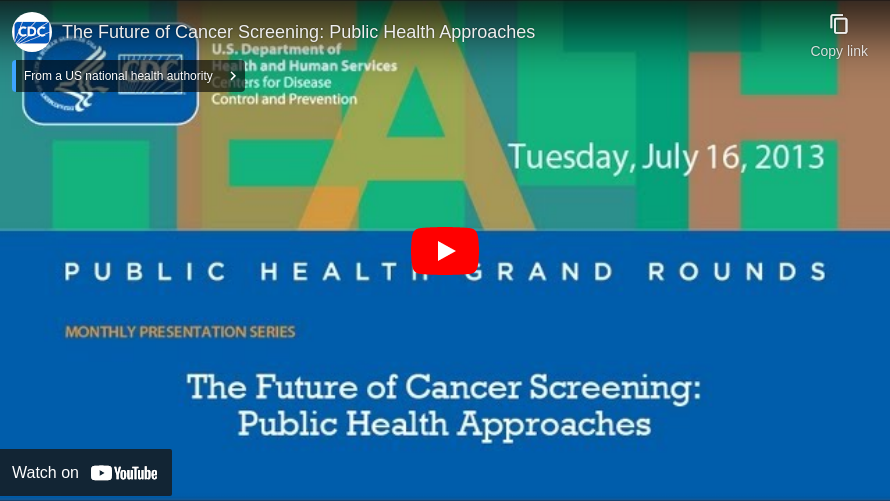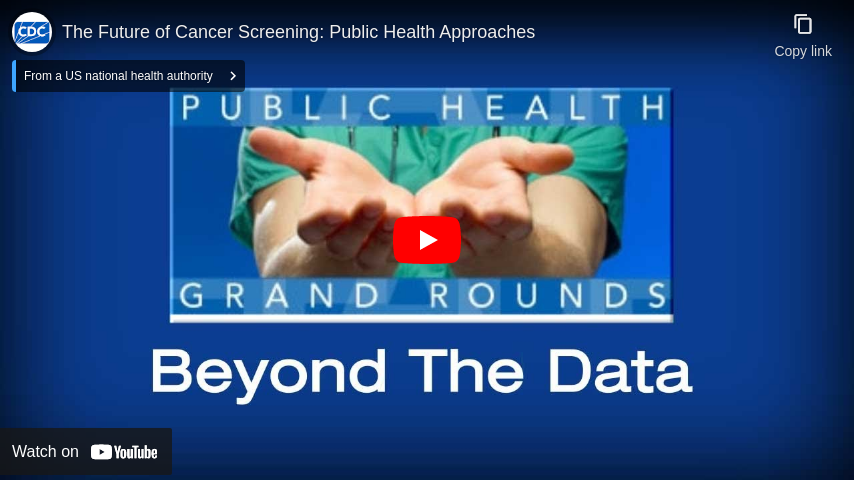The Future of Cancer Screening: Public Health Approaches
Presented on .
Cancer is the second-leading cause of death among Americans and takes a toll on communities across the United States. One of the effective ways to reduce our nation’s burden from cancer is to ensure that high quality screening services are available and accessible to all Americans. Screening for cervical, colorectal, and breast cancers is supported by sound scientific evidence, and helps find these diseases early when they are easiest to treat.
This session of Grand Rounds explored new ways that public health can increase the rate of evidence-based cancer screening, and decrease disparities in screening rates. Viewers learned about the effectiveness of screening, successful organized cancer screening programs in the United States and abroad, and opportunities with the Affordable Care Act. The session concluded with future directions for CDC and the nation’s public health system to improve cancer screening.
Dr. John Iskander and Dr. Marcus Plescia discuss the approaches necessary to improve cancer prevention screening rates:
- Widespread access to affordable health insurance
- Continued provider recommendations
- Strategic approaches to reaching the public
- Otis W. Brawley, MD
- Chief Medical Officer
American Cancer Society
- Rachel Ballard-Barbash, MD, MPH
- Associate Director, Applied Research Program,
Division of Cancer Prevention and Control and Population Services,
National Cancer Institute
National Institutes of Health
- Ned Calonge, MD
- President and CEO
The Colorado Trust
- Theodore R. Levin, MD
- Clinical Lead for Colorectal Cancer Screening
Kaiser Permanente Northern California Division of Research
- Marcus Plescia, MD, MPH
- Director, Division of Cancer Prevention and Control
National Center for Chronic Disease Prevention and Health Promotion, CDC
- Tanja Popovic, MD, PhD
- Scientific Director
- John Iskander, MD, MPH
- Deputy Scientific Director
- Susan Laird, MSN, RN
- Communications Director
Get notified about the latest updates from Public Health Grand Rounds right in your inbox by setting up an alert today!
Get notified about the latest updates from Public Health Grand Rounds right in your inbox by setting up an alert today!Sign Up
Get notified about the latest updates from Public Health Grand Rounds right in your inbox by setting up an alert today!

The risk factors for cancer are many and varied. Inherited genetic mutations play a major role in 5 to 10 % of all cancers. When genetic mutations are identified early, patients are able to work with their healthcare providers. Find out how public health agencies are evolving in the rapidly growing field of genomics.


